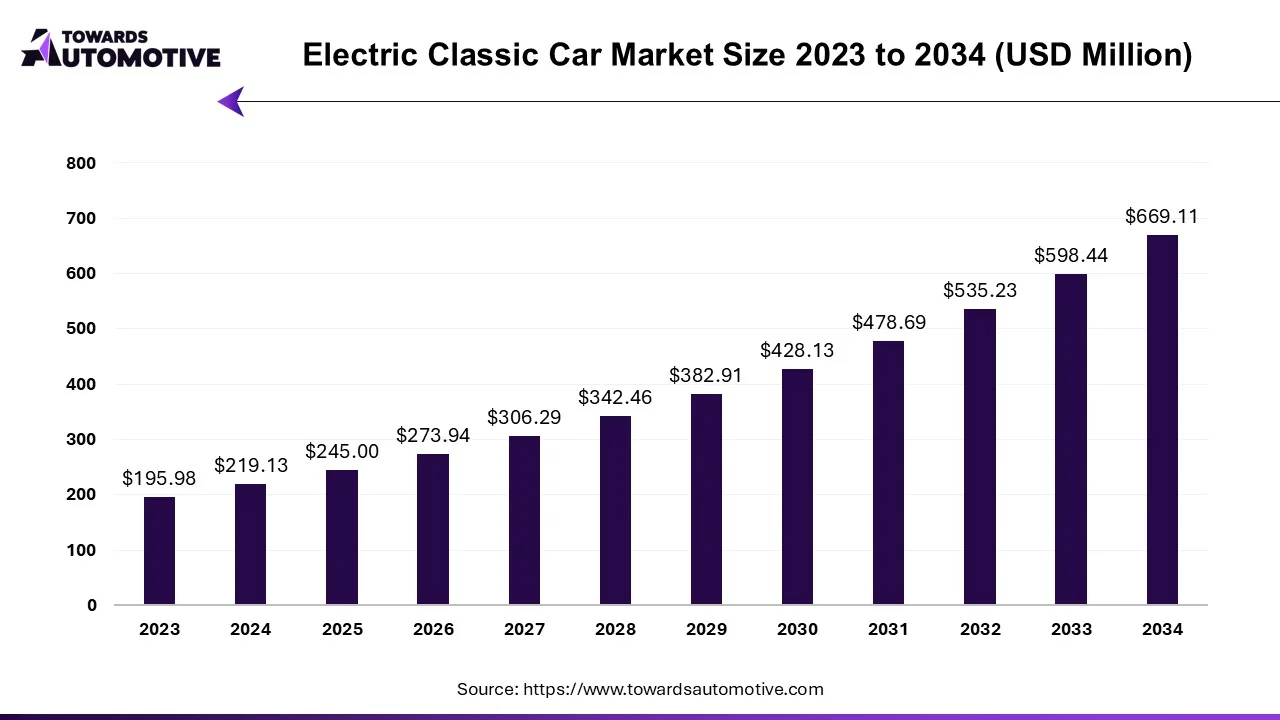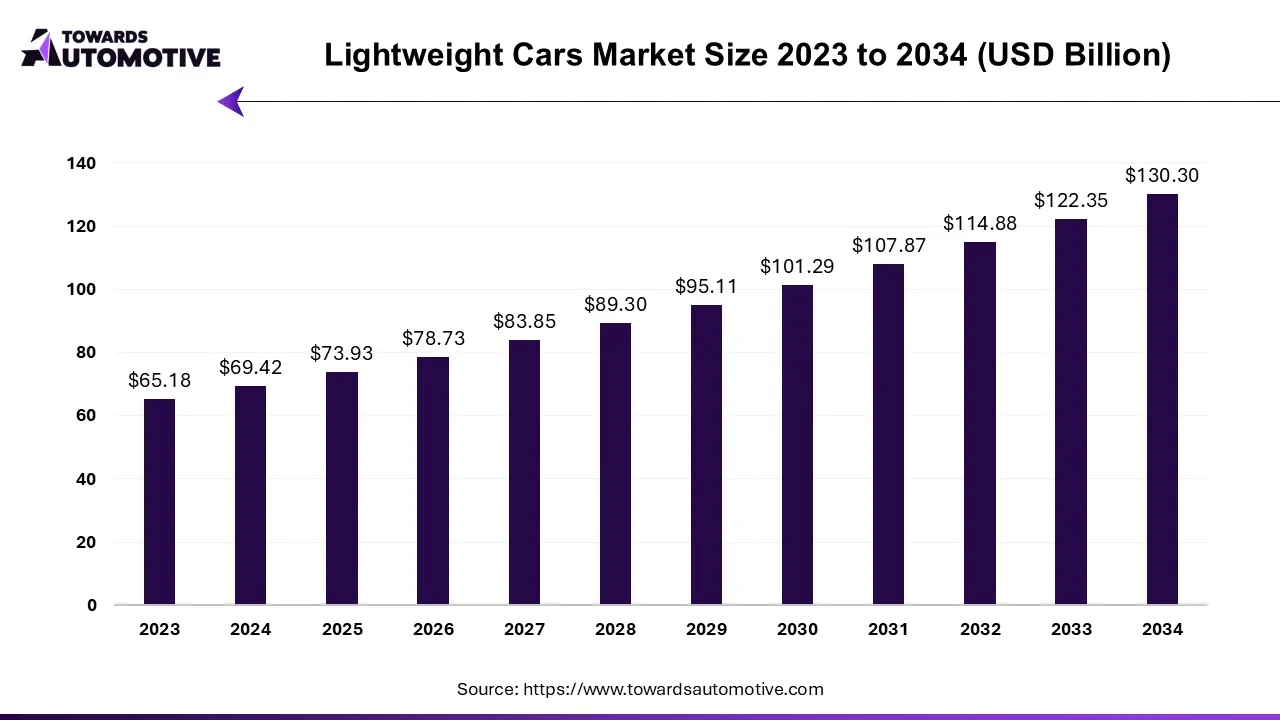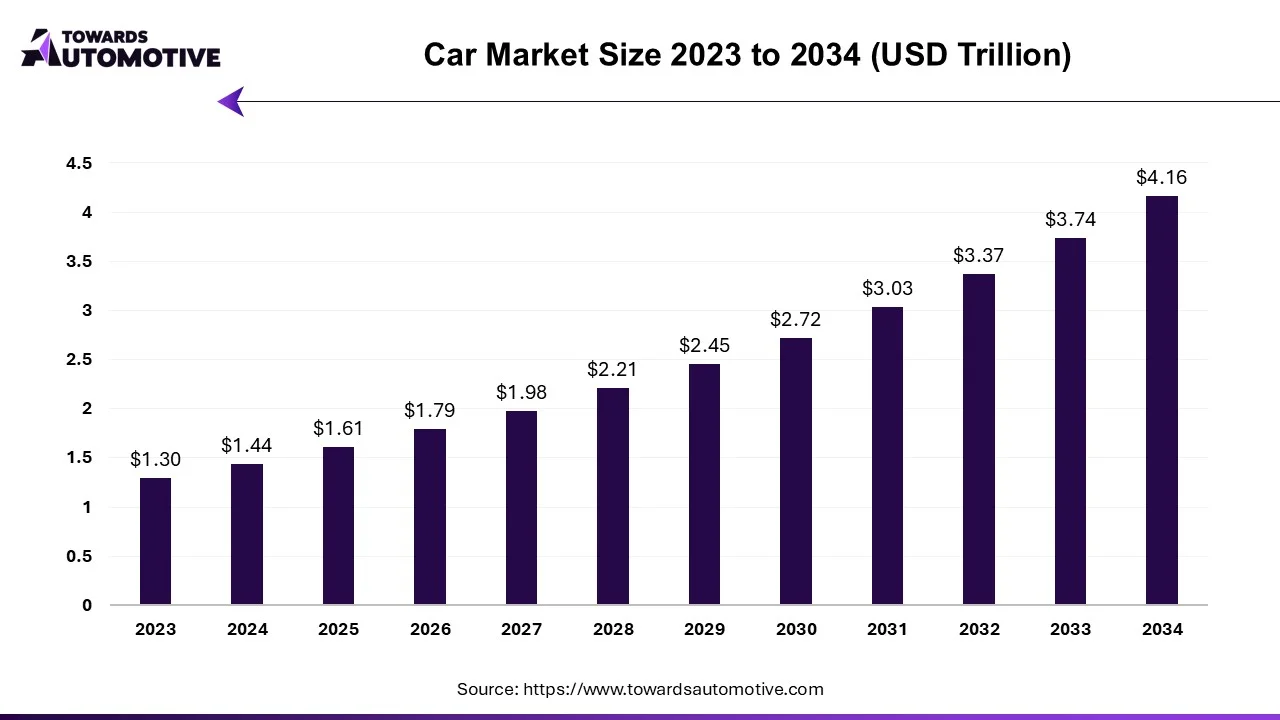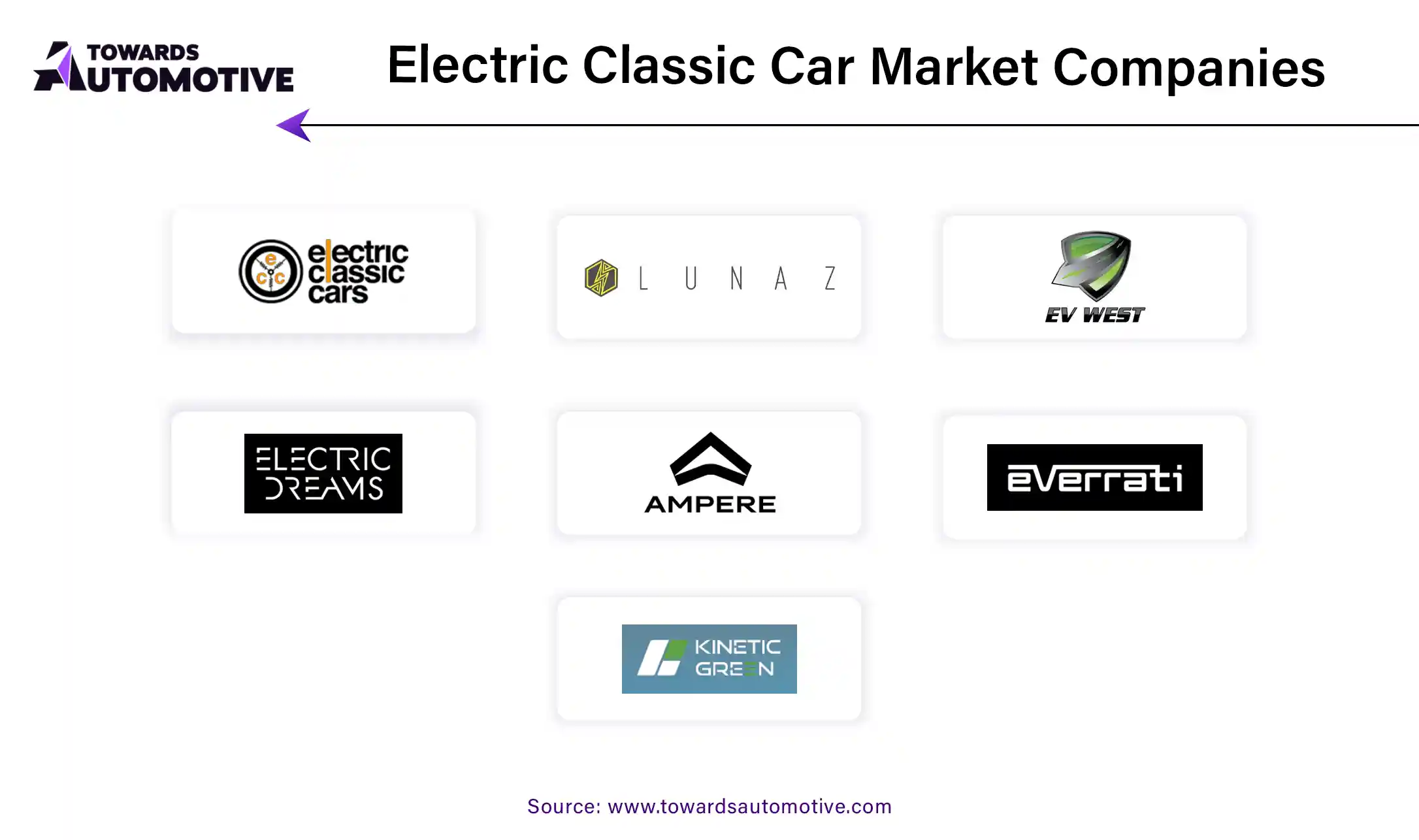Electric Classic Car Market Import & Export Overview
The electric classic car market is projected to reach USD 669.11 million by 2034, growing from USD 245.00 million in 2025, at a CAGR of 11.81% during the forecast period from 2025 to 2034.

The electric classic car market is experiencing a renaissance, blending timeless automotive design with cutting-edge electric propulsion technology.
Preserving Heritage with Sustainable Mobility
Electric classic cars represent a harmonious fusion of automotive heritage and sustainable mobility. By retrofitting iconic classic cars with modern electric drivetrains, enthusiasts and collectors can enjoy the timeless appeal of vintage automobiles while reducing carbon emissions and promoting environmental conservation. Electric classic cars offer silent, emissions-free driving experiences without compromising on performance or style, appealing to a new generation of eco-conscious drivers and enthusiasts.
Key Components and Features of Electric Classic Cars
- Electric Powertrain: The heart of an electric classic car is its electric powertrain, comprising an electric motor, battery pack, and power electronics. These components replace the traditional internal combustion engine, transmission, and fuel system, providing instant torque, smooth acceleration, and regenerative braking capabilities. Electric powertrains offer enhanced reliability, efficiency, and sustainability, transforming classic cars into zero-emission vehicles while preserving their original character and charm.
- Battery Technology: The adoption of advanced battery technology is a defining feature of electric classic cars. Lithium-ion battery packs provide high energy density, long-range capability, and rapid charging times, enabling electric classic cars to travel extended distances on a single charge. Battery management systems (BMS) ensure optimal performance, longevity, and safety of the battery pack, enhancing the overall reliability and usability of electric classic cars.
- Charging Infrastructure: Charging infrastructure plays a crucial role in supporting the adoption and usability of electric classic cars. Owners and enthusiasts rely on a network of charging stations, home chargers, and destination chargers to recharge their vehicles conveniently and efficiently. With the proliferation of fast-charging technology and interoperable charging standards, electric classic car owners can enjoy seamless access to charging facilities, enabling worry-free long-distance travel and adventure.
Market Dynamics and Trends
- Heritage Conservation:Electric classic cars embody a unique blend of automotive heritage and modern technology, appealing to enthusiasts, collectors, and preservationists alike. As concerns about climate change and air pollution grow, there is a renewed focus on preserving vintage automobiles while embracing sustainable mobility solutions. Electric classic cars offer a compelling alternative to traditional restoration projects, providing owners with eco-friendly driving experiences and future-proofing their investments for generations to come.
- Regulatory Support:Government incentives, subsidies, and emissions regulations are driving the adoption of electric vehicles, including electric classic cars. Many countries and regions offer financial incentives, tax breaks, and rebates for electric vehicle owners, encouraging the conversion of classic cars to electric powertrains. Regulatory exemptions for historic vehicles and low-emission zones further incentivize the transition towards electric classic cars, promoting cleaner air and sustainable transportation solutions.
- Technological Advancements:Ongoing advancements in electric vehicle technology, battery chemistry, and power electronics are driving innovation in the electric classic car market. Companies specializing in electric vehicle conversions offer bespoke solutions tailored to specific classic car models, preserving their original aesthetics and driving dynamics while enhancing their performance, efficiency, and reliability. As battery technology continues to evolve, electric classic cars are poised to become more accessible, affordable, and practical for enthusiasts and collectors worldwide.
Global Trends and Market Outlook
North America and Europe Lead Adoption
North America and Europe are at the forefront of the electric classic car market. These regions boast rich automotive heritage, and the demand for electric classic cars aligns with stringent emissions regulations, environmental consciousness, and a robust culture of classic car appreciation.
Rising Popularity in Asia-Pacific
The Asia-Pacific region is witnessing a surge in interest in electric classic cars, driven by affluent collectors, increasing environmental awareness, and a desire for distinctive, customized automotive experiences.
Future of Electric Vehicles Market
The electric vehicles market is forecast to grow from USD 2,072.80 billion in 2025 to USD 29,283.45 billion by 2034, driven by a CAGR of 34.21% from 2025 to 2034. The increasing demand for eco-friendly vehicles in developing nations along with technological advancements in the automotive sector is playing a vital role in shaping the industrial landscape.
Additionally, numerous government initiatives aimed at developing the EV charging infrastructure coupled with rise in number of EV startups in developed regions has driven the market expansion. The research and development activities related to solid-state batteries is expected to create ample growth opportunities for the market players in the future.

The electric vehicles market is a prominent segment of the automotive industry. This industry deals in development and distribution of vehicles that are powered by batteries. There are several types of vehicles developed in this sector comprising of scooters, motorcycles, three-wheelers, passenger cars, buses, trucks, and some others. These vehicles are integrated with numerous components including battery pack & high voltage component, motor, brake, wheel & suspension, body & chassis, low voltage electronic components and some others. The end-users of these vehicles comprise of personal users and commercial users. This market is expected to rise significantly with the growth of the battery manufacturing sector around the globe.
Future of Lightweight Cars Market
The lightweight cars market is forecasted to expand from USD 73.93 billion in 2025 to USD 130.30 billion by 2034, growing at a CAGR of 6.50% from 2025 to 2034.

This market encompasses vehicles engineered with materials and technologies aimed at reducing overall weight, resulting in improved fuel efficiency, performance, and environmental sustainability.
A primary driver of the lightweight car market is the global push for fuel efficiency and stringent emission regulations. Governments worldwide are enforcing stricter standards to combat climate change, prompting manufacturers to develop lighter, more fuel-efficient vehicles. This regulatory landscape aligns with consumer preferences for enhanced performance and environmental responsibility.
Future of Car Market
The car market is projected to reach USD 4.16 trillion by 2034, expanding from USD 1.61 trillion in 2025, at an annual growth rate of 11.15% during the forecast period from 2025 to 2034. The rising demand for luxury cars in developed nations along with rapid investment by automotive companies for manufacturing numerous types of cars is playing a vital role in shaping the industrial landscape.
Moreover, the growing adoption of eco-friendly cars by fleet operators to reduce vehicular emission coupled with technological advancements in the car manufacturing sector has contributed to the market expansion. The research and development activities related to autonomous vehicles is expected to create ample growth opportunities for the market players in the upcoming days.

The car market is a crucial sector of the automotive industry. This industry deals in manufacturing and distribution of various types of cars in different parts of the world. There are various types of vehicles developed in this sector comprising of hatchbacks, sedans, SUVs, sports cars and some others. These cars are powered by numerous propulsion technology including gasoline, diesel, electric and FCEVs. The end-users of these cars consist of commercial fleets and individual consumers. The growing production of passenger vehicles in developing nations has contributed to the industrial expansion. This market is expected to rise significantly with the growth of the EV sector around the globe.
Market Segmentation and Regional Outlook
By Vehicle Type
- Vintage Cars
- Classic Cars
- Sports Cars
- Luxury Cars
By Conversion Method
- Complete Restoration
- Partial Conversion
- Bolt-On Conversion Kits
By Region
- North America
- United States
- Canada
- Mexico
- Europe
- United Kingdom
- Germany
- France
- Italy
- Spain
- Asia-Pacific
- China
- Japan
- South Korea
- Australia
- India
Key Players in the Electric Classic Car Market
The electric classic car market is characterized by a diverse ecosystem of manufacturers, conversion specialists, and restoration workshops. Some of the key players in the market include

- Electric Classic Cars
- Lunaz Design
- Electric GT
- Zelectric Motors
- EV West
- Charge Cars
- Electric Dreams
- Ampere Motor
- Everrati Automotive
- Lunaelectric
Recent Developments and Innovations
- In December 2023, Lunaz Design unveiled its electrified version of the iconic Rolls-Royce Phantom V, featuring a bespoke electric powertrain, state-of-the-art battery technology, and meticulously restored craftsmanship. The electric Rolls-Royce Phantom V offers zero-emission luxury motoring, combining timeless elegance with modern sustainability for discerning collectors and enthusiasts.
- In November 2023, Electric GT introduced its electrified version of the classic Porsche 911, featuring a high-performance electric powertrain, lightweight carbon fiber bodywork, and advanced aerodynamics. The electric Porsche 911 delivers exhilarating performance, instant torque, and silent operation, while retaining the iconic design and driving dynamics of the original sports car.
- In October 2023, Charge Cars announced the launch of its electric Ford Mustang, blending classic American muscle car styling with modern electric propulsion technology. The electric Mustang features a powerful electric motor, fast-charging capability, and smart connectivity features, appealing to enthusiasts seeking a sustainable yet thrilling driving experience.
- In September 2023, Electric Classic Cars unveiled its electrified version of the Volkswagen Type 2 camper van, offering emissions-free travel, off-grid capabilities, and retro-inspired design. The electric VW camper van features a custom-built electric powertrain, solar panels, and modern amenities, providing adventurers with a greener, quieter, and more enjoyable camping experience.
- In August 2023, Zelectric Motors introduced its electric conversion kit for classic Porsche 356 models, allowing owners to retrofit their vintage sports cars with modern electric powertrains. The Zelectric Porsche 356 conversion kit includes a high-performance electric motor, lithium-ion battery pack, and integrated cooling system, enabling seamless integration and enhanced performance for classic car enthusiasts.
- Electric Classic Car Market Overview - Market Size (USD Million) and CAGR (2025-2034): 100%
- Market Segmentation by Vehicle Type - Breakdown of Market Share (Vintage Cars 20%, Classic Cars 30%, Sports Cars 25%, Luxury Cars 25%)
- Market Segmentation by Conversion Method - Breakdown of Market Share (Complete Restoration 40%, Partial Conversion 35%, Bolt-On Conversion Kits 25%)
- Market Segmentation by Region - Regional Market Share (North America 35%, Europe 40%, Asia-Pacific 25%)
- Electric Powertrain Components - Composition and Market Share (Electric Motor 40%, Battery Pack 40%, Power Electronics 20%)
- Battery Technology Adoption - Market Share of Lithium-ion Battery Packs and BMS
- Charging Infrastructure Growth - Number of Charging Stations and Projected Growth
- Competitive Landscape - Market Share of Key Players (Electric Classic Cars 15%, Lunaz Design 10%, Electric GT 12%, Zelectric Motors 8%, EV West 6%, Charge Cars 9%, Electric Dreams 7%, Ampere Motor 8%, Everrati Automotive 10%, Lunaelectric 5%)
List of Tables
- Electric Classic Car Market Segmentation by Vehicle Type - Market Share (Vintage Cars 20%, Classic Cars 30%, Sports Cars 25%, Luxury Cars 25%)
- Electric Classic Car Market Segmentation by Conversion Method - Market Share (Complete Restoration 40%, Partial Conversion 35%, Bolt-On Conversion Kits 25%)
- Electric Classic Car Market Segmentation by Region - Market Share (North America 35%, Europe 40%, Asia-Pacific 25%)
- Key Players in the Electric Classic Car Market - Company Share (Electric Classic Cars 15%, Lunaz Design 10%, Electric GT 12%, Zelectric Motors 8%, EV West 6%, Charge Cars 9%, Electric Dreams 7%, Ampere Motor 8%, Everrati Automotive 10%, Lunaelectric 5%)
- Electric Classic Cars - Market Growth Trends and CAGR by Region - CAGR Growth Estimates for North America, Europe, and Asia-Pacific
- Electric Classic Car Adoption Trends - Market Share of Full vs. Partial Restoration and Conversion Kits
- Battery Technology and Charging Infrastructure - Adoption Rate of Lithium-ion Batteries and Charging Stations




